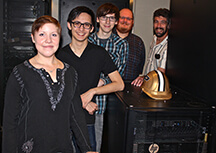Student supercomputing team from Purdue, Colombia aims for super performance in Germany
July 7, 2015
 |
|
Emma Wynne, a senior in computer science from Indianapolis, John Lee, a senior in computer engineering from Boise, Idaho, Matt Molo, a senior in computer science from Joliet, Illinois, and Purdue research computing staff members and team advisers Stephen Harrell and Lev Gorenstein stand around the mini supercomputer they're taking to Germany. |
WEST LAFAYETTE, Ind. – Purdue University computer science major Emma Wynne has spent a lot of time writing programs for her classes, but not so much on the hardware where those programs run. That made an international competition, where she will help build and operate a student-run supercomputer, an attractive opportunity.
Wynne is part of the six-member combined Purdue and Universidad EAFIT, Colombia, team competing at the July 12-16 ISC15 supercomputing conference in Europe, one of the supercomputing industry’s major gatherings. Purdue and HP sponsor the student team.
“Educationally speaking, the team is a totally new experience,” says Wynne, a senior from Indianapolis. “Being a part of it is giving me great practice with the systems side of computing. I think that will expand my future career path to incorporate systems work as well as programming.”
The Purdue-EAFIT team is one of 11 in the competition, which takes place in Frankfurt, Germany. It is the only team with U.S. members and the lone international partnership. The other teams are from schools in Brazil, China, Estonia, Germany, India, South Africa and Spain.
Besides Wynne, Purdue students on the team include John Lee, a senior in computer engineering from Boise, Idaho, and Matt Molo, a senior in computer science from Joliet, Illinois. The Colombian team members are Alejandro Gómez, Mateo Gómez and Pablo Restrepo, all seniors in computer science at Universidad EAFIT in Medellin. Purdue research computing staff members Stephen Harrell and Lev Gorenstein, and EAFIT professor Juan Guillermo Lalinde, advise the team.
Purdue and Colombia began a research, education and economic development partnership in 2010 and sent a joint team to a U.S. student supercomputing competition in 2014.
“It's an incredible opportunity to learn more about the world of high-performance computing, meet new people and cultures, and also continue to develop my skills in this field and my chance of going to work in it,” says Alejandro Gomez, who was on the 2014 team, too.
The students, all undergraduates, assemble their own mini supercomputer and configure it to run a battery of benchmarking programs and scientific software to process real science data provided by the competition organizers. The goal is to score the highest benchmark and crunch as much of the data as possible between Monday evening and Wednesday afternoon.
The known applications include software for physics, chemistry and aero- and hydrodynamics. The competition also features “mystery” applications that the teams will be assigned upon arriving in Germany. In addition to assembling its system, the team works to tailor the applications to best fit its machine.
“The biggest challenge we're going to have is really understanding the apps and how to get that little bit of performance out of them,” says Molo, who’s been a member of Purdue teams in U.S. and Asian student supercomputing competitions. “But, I think we have a great team so, hopefully, it all goes well.”
Purdue, which in May built its eighth research supercomputing system in eight years, has the best high-performance computing infrastructure for use by faculty researchers on a single campus in the United States. More than 160 Purdue research labs and hundreds of faculty and students use these supercomputers to develop new treatments for cancer, improve crop yields to better feed the planet, engineer quieter aircraft, study global climate change and probe the origins of the universe, among many other topics.
Contact: Greg Kline, science and technology writer, Information Technology at Purdue, 765-494-8167 (office), 765-426-8545 (cell), gkline@purdue.edu.

